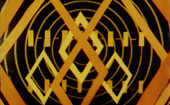 For
Immediate Release:
For
Immediate Release:
Oskar Fischinger Retrospective January 2, 2006 at Lincoln Center, New York.
The Film Society of Lincoln Center in association with The Center for Visual Music presents "Oskar Fischinger: Optical Etudes," featuring many preserved prints of Fischinger's classic Visual Music films.
January
2, 2006, 5:00 and 9:00
(program screens twice, separate admissions) NOTE
TIME CHANGE*
Lincoln Center,
Walter Reade Theater, 165 West 65th Street, plaza level, New York, New York
Tickets on sale online through Lincoln
Center
site (www.filmlinc.com)
and at the box office.
For those never exposed to the brilliant, minimalistically designed and hyperactive abstract shapes so artfully manipulated on these celluloid canvases, prepare yourselves for an intellectually stimulating, sometimes emotionally overwhelming experience. (Greg Ford)
Decades before computer graphics, before music videos, even before "Fantasia" (the 1940 version), there were the abstract animated films of Oskar Fischinger (1900-1967), master of "absolute" or nonobjective filmmaking. He was cinema's Kandinsky, an animator who, beginning in the 1920's in Germany, created exquisite "visual music" using geometric patterns and shapes choreographed tightly to classical music and jazz. (John Canemaker)
We now understand Oskar Fischinger not only as a link between the geometric painting of pre-war Europe and post-war California but as a grandfather of the digital arts. (Peter Frank)
The program samples glimpses of Fischinger's earliest silent endeavors before plunging headlong into his unmistakable universe of vibratory parallel lines, comet-like spheroids and pulsating concentric circles, favorite primal forms deployed in one-to-one matchups with pieces by Brahms (1931's Study No. 7), Wagner and Grieg (1933's Kreise), Mozart (1935's Muratti Privat cigarette ad), John Phillip Sousa (1941's American March), and Johann Sebastian Bach (1947's Motion Painting No. 1). Fischinger's technique, equally adept at interpreting then-contemporaneous pop music, testifies to the powerful effects that can be wrought through pure abstraction. Biographer William Moritz wrote, "Oskar Fischinger is one of the greatest artists of the 20th century, embracing the abstraction that became the major art movement of that century, and exploring the new technology of the cinema to open abstract painting into a new Visual Music that performs in liquid time." (Greg Ford)
Program also includes: Allegretto (2 versions), Radio Dynamics, Study No. 6, Spiritual Constructions, R-1 Ein Formspiel, Walking from Munich to Berlin and more. 35mm and 16mm.
Program provided by Center for Visual Music. Prints preserved by the Academy Film Archive, CVM and Fischinger Archive, with the support of Film Foundation, Sony, Deutsches Filmmuseum and Cinémathèque Québécoise.
These screenings are part of the Film Society's Cartoon Musicals II series.
* TIME CHANGE - since the mailing of the announcement postcards, the times have been changed slightly. The new correct times are 5 and 9 pm
For Further
Information:
Center for Visual Music - CVMarchive@gmail.com
www.centerforvisualmusic.org
Los Angeles 213-683-1514
Center for Visual Music is a nonprofit film archive dedicated to visual music, experimental animation and avant-garde media.
Still from Allegretto (c) Elfriede Fischinger Trust, all rights reserved